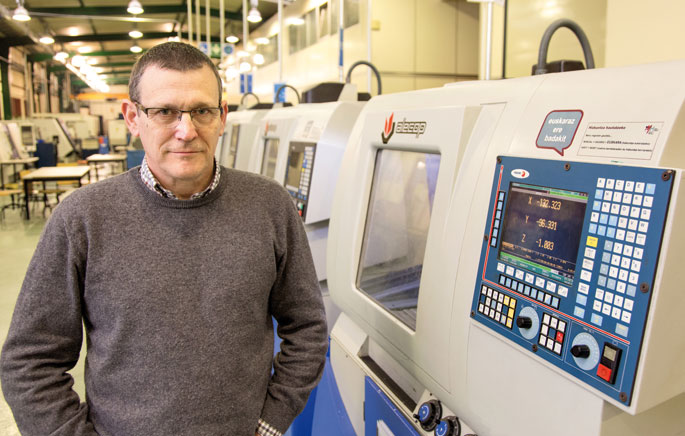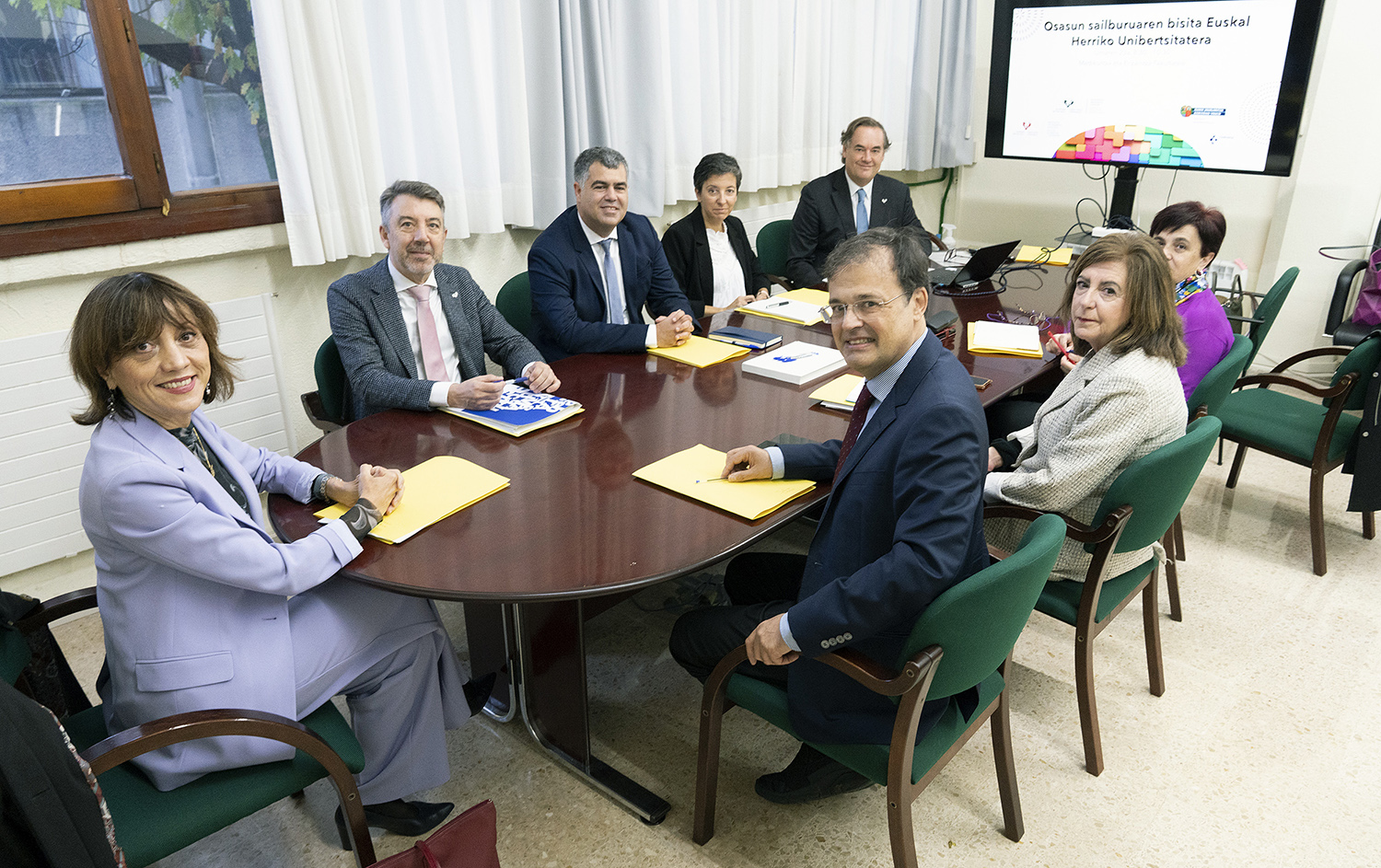"Companies that have done a lot have started coming to their roofs"
- In the fall of 2015, we heard the days at their work center, the Elgoibar Machine Tool Institute. There was talk of pioneering companies in Euskaldunization, and a thesis: we have to calculate the linguistic combinations between the workers and the tools to know how much they can do in Euskera. This will help fine-tune the achievements. Fermin Lazkano is the director of IMH’s Tkgune Manufacturing Network for Innovation.

You say that the Euskaldunization of the business world is not slowing down yet, but it will begin. Why do you say that, it's a field that has begun to be cultivated not so long ago?
We have to know where we are so as not to fall into sterile optimism and malicious pessimists. All processes have their rhythm, having walked very quickly in the first few moments can slow down or, when it comes to more complicated processes, at first it can slow down and then accelerate when some keys are found.
We are still in the process of crescendo, but there will be a point where it will be more difficult to achieve the achievements at the same pace. Something happens. At first, it's very important the environment, the enthusiasm, the intention, the stimulus, the message of the direction, and that gets us all. You put it leitmotiva, it's up to us all, and many forces come together at the same time to support it. It's the set of individual decisions.
But then comes the time of the personal field, the decision has to be made by oneself, the next leap has to be made by concrete people.
Can you explain it with an example?
Our experience here. At first they were campaigns. "We're going to put the labeling in Euskera! We're going to translate the tools! We're going to do surveys..." And it was going well, the [use] curve was on the rise. Today we are stuck. A dozen people jump or there's nothing better to do. The responsibility lies with the people, be it Euskaldunes or Castellanoparlantes, since not all Basques speak in Basque.
When the desires and capabilities of a crew are combined, the force and the result are multiplied. Suppose there are ten people, eight Euskaldunes, but they do it in Spanish. They decide, in the absence of both, to act in Basque. The eight will not do so, but they can reach five. From that moment on, all of a sudden, they've made a big leap. The question is how far this force is coming. Some of these six will start to get tired, “we adapt very well in speech, but in writing no...”, obstacles begin to appear and we reach the ceiling of the forces that existed at the beginning.
Does it mean that companies are hitting the roofs?
We realize there's a roof, and we look at why it's there. Let’s say it’s because we don’t have enough written dexterity, “to you, we’re going to do a literacy course, four hours a week in the Basque Country, paid by the company.” This gives another push and starts the next jump, but it also has its roof. We are breaking the roofs and each has its key to breaking.
So in the 1990s, we started to Euskaldunize the business world. Companies that have done a lot have begun to hit their roofs. In 2003, we made the first Euskera plan and we've seen what our roof is. The same is true in many other places.
Sabaiak sabai says that achievements should be measured statistically and that little is done in the Euskaldunization of companies.
In similar companies, one of them has reached Euskaldunisation of 70% and the other has remained at 40%. If you analyze the combinations between agents (people and tools), you'll realize that you couldn't get better results. It can be more successful than the company that has reached 40% than the company that has reached 80%, as you already know in advance the potential of each one. That is the essence of my thesis.
Specify your thesis further, i.e. explain the individual/non-contributor/non-client formula.
First of all, there is the worker. That is what you have to decide if you are going to act in Basque or Spanish. Secondly, there is their relationship with colleagues. Thirdly, the relationship with outsiders, that is to say with customers. Fourth, the relationship between the worker and instruments [computer, numerical control...]. Tools are increasingly the intermediaries of workers.
To what extent does the instrument influence the use of the language of the employee?
The other day, in the workshop, I went to a numerical control machine and I realized that I was in Spanish. It's from Fagor and it's Euskera version. Some students from Azpeitia were there, and I told them I was bringing them from ARGIA to photograph me and put me in Basque. “Are you in Basque or not?” They didn't know. If they had used the Basque version, the programming language would have been used in Basque, but being in Spanish they tend to do it in Spanish. That is extremely conditioning.
Why do you say it conditions it a lot?
If I write on a spreadsheet and the orders are in Basque, I know a number of words: “row”, “medium”, “variance”… Thanks to the machine you get used to using those words and then start a technical conversation very easily. But if you have the “file-paste”, when you’re talking about it, you’ll immediately touch Spanish.
The same in the industry?
Technical vocabulary can have an important weight. Danobat has made two or three versions of his machine tool technical dictionary. Fagor Ederlan de Tafalla has distributed his technical vocabulary to all the staff. That makes the conversation in Basque easier. What do you talk about in the workshop, in the crew or in the family? No, it's about work, it's about technical stuff: wrinkles, rectified…
The one who goes halfway, the Euskaldun berri, but who has the necessary tool to speak in Euskera, worries me. The excuse is easy because it does not dominate the technical vocabulary and uses Spanish. When you have the dictionary, you erase the excuse and reason (it's not just an excuse). Anyone who wants to get used to it and suddenly realizes that the workshop talks about Basque with some technical issues. Then it will not do so also on the street in Basque, in a much easier environment! The impact is brutal. If we believe, as we have believed, that it is important to put street signs in Basque, is it not at least the same thing to have Basque words about work in the workplace?
All this is important because it alters the person's decision.
To that extent?
For me, yes. Speaking in Basque or in Spanish is a click. It may be two to three years since you decide to do so in Basque, but the decision is instantaneous. These decisions are very powerful, everything that leads to it is worth the environment, the linguistic landscape, what the friend tells him, the music that is heard, the coincidence and saying, “You are able to use the word in Basque, do I put it to you?” Perhaps by then he has already made the decision to start in Basque.
You say that you have to draw concrete accounts, that the frequencies of the relationships between colleagues and partners, between partners and tools, and that the tools are mediators of colleagues and partners.
Let me give you an example. A company has called a job and what remains first in the examination is a phenomenon, but it does not dominate the Basque country, it is slow. What to do? Let us think that you want to take responsibility for a job. Let’s count on the number of teammates and teammates and know how many relationships you will have each day with your peers and colleagues. Suppose you're in the direction, calculate the number of meetings you should have. Before the hiring of the new worker the use is so wide that if he joins his job, the decrease is such, according to the calculations made. Is the company willing to have that drop?
That is your claim.
Basque plans must evolve towards that point, they must integrate statistical calculations. For example, depending on the number of workers you know Euskera and the number of tools you have in Euskera, it may occur that in a workplace the percentage of use of Euskera is 30%. Here's Txillardegi's mathematical analysis: Euskaldunes so much, Castellanoparlantes so much, they'll make combinations between them and, at most, they'll do so much in Euskera. Apply the same to the Basque plans.
We attach great importance to motivation, etc., and we must give it, I am not against it, but we forget the purely quantitative, statistical aspects. That is my demand. We are losing power in the plans for Euskera. With this, maybe we could overcome several roofs.
He says that the Basque Government is offering tools in Basque. Little of what has been done and no knowledge of what is there. What do you ask the administration?
Let's say the things that are done. Office programs, plugins, etc. www.euskadi.net All right, things are done. Much more than before.
Fagor uses SAP ERP. It is a software created by the German multinational for the general management of companies. It's the most widely used in the world. It is present in all the computers of the company, in the workshops, in the offices, on the cell phone that is being sold in Berlin, in the decision-making of management… There are some modules translated, but they are very difficult to obtain publicly.
Fagor has a numerical control program euskaraz.Fagorrekoek to manage machines, they usually say that at eleven sites they speak in Basque and do not put the discard in Basque.
The second error is the update. Microsoft Office, etc. I understand that there is a terrible job and that we have to do it quickly, I understand that it is expensive. I understand that, but I do not accept it. Associations like Librezale are voluntarily translating into Basque. Well, what are you going to do? Let the Basque Government lead it! We are going to decide between all the starting points, and that is what we are all going to do. Meanwhile, thanks to associations like Librezale.
In recent months I have had to work in a number of institutes and, at some point, I have had to talk to the students about the possibilities offered by the labour market. The typology of the students is varied and in the same city varies a lot from one neighborhood to another,... [+]
Languages Lan has just organised the first international conference on linguistic management in Bilbao. Much has been said in the Congress about language policy, management and tools. And emotions. And from emotions, how many cooperatives, companies and organizations in our... [+]
Few spend their whole lives at the same work. What was common at the time of our parents, today, is absolutely unusual. It seems that millennial generation youth will not spend five years in the same job and the time will be much shorter between Z and Alpha generations.
I too,... [+]
It is often difficult to find a service or product in Basque. Not everything can be achieved in Basque. We must look for suppliers that offer us products and/or services in Basque, both in the private and professional spheres.
Consumer legislation in the regulations of the... [+]




















